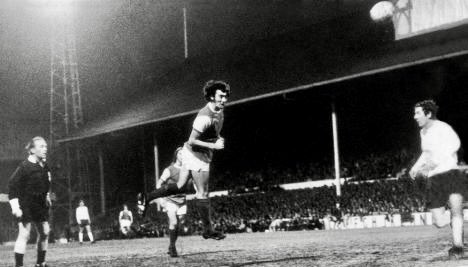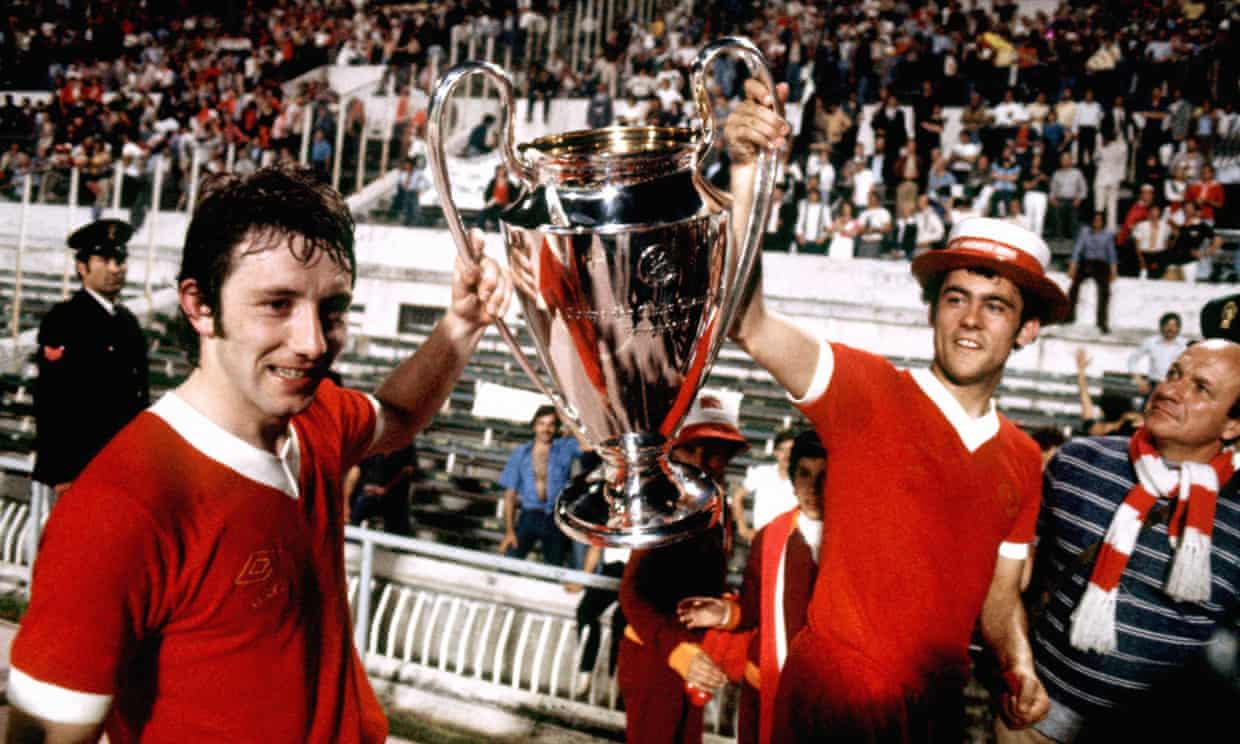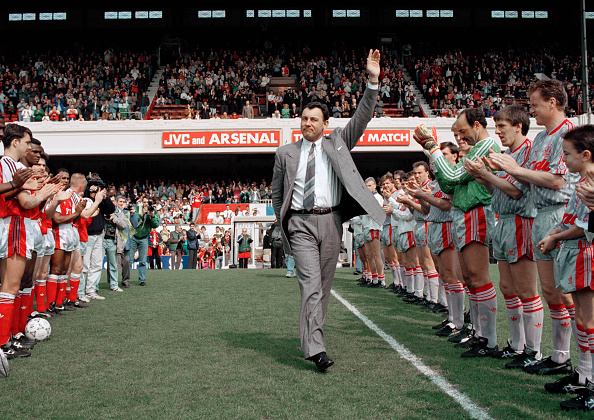Ray Kennedy was a legend at age 18, a legend for 2 different teams at 25, and said to be past it at 30. That was unfair. But the truly unfair was yet to come.
Raymond Kennedy (no middle name) was born on July 28, 1951 in Seaton Delaval, Northumberland, 8 miles northeast of downtown Newcastle, and 50 miles southeast of the England-Scotland "border." This is the North-East, a place that American sportswriter Chuck Culpeper wrote is "where England begins to think about turning into Scotland." People there are called "Geordies," and their accent is often so thick, even Scotsmen and other Englishmen find them hard to understand.
But the region is crazy about football (what we call soccer), and no less an English legend than Sir Stanley Matthews came to the Kennedy family home, to persuade a 16-year-old Ray to sign for Port Vale in Stoke-on-Trent, Staffordshire. But, given a tryout, Sir Stan decided that Ray was too slow.
Matthews admitted in his memoir, "Of course, there is always one lad who slips through the net, and for me, that was Ray Kennedy, who went on to find fame and fortune with Arsenal, Liverpool and England. Ray turned out to be a superb player, and all I can say in my defence is, he was a late developer!"
He went back home, and got a job in a candy factory, and led New Hartley Juniors to victory in every competition they entered. A scout from North London team Arsenal saw him, and he signed an apprentice contract with them in May 1968. He made his first-team debut on September 29, 1969, a 1-0 loss to Glentoran at The Oval in Belfast, Northern Ireland in the 1st Round of the Inter-Cities Fairs Cup. However, Arsenal had won the home leg 3-0, and advanced on aggregate.
Arsenal reached the Final of this tournament, now known as the UEFA Europa League. It was a two-legged Final, home and away, against Anderlecht, outside Brussels, Belgium. In the away leg, Arsenal trailed 3-0, when manager Bertie Mee sent Kennedy on as a substitute in the 77th minute. His header in the 82nd minute got them an away goal. He wasn't yet 19 years old -- "late developer," Sir Stan? -- and, for the 1st time, a newspaper printed the headline "RAY OF HOPE" about him.
The home leg, at the Arsenal Stadium, nicknamed Highbury for its neighborhood, was played without Kennedy entering the game. This time, Arsenal didn't need him: They won it, 3-0, to win 4-3 on aggregated, and claim their 1st European trophy, their 1st major trophy of any kind since the 1953 Football League Division One title.
In the 1st game of the 1970-71 season, Charlie George, considered Arsenal's best all-around player, broke his ankle. This and other injuries required a reworking of the starting lineup. Kennedy was inserted as strike partner for the established John Radford, and it worked wonders. Kennedy scored 26 goals, to lead the team.
He scored 3 goals in a home League match with Nottingham Forest; and 2 each in home League matches against West Bromwich Albion and Everton, a home match against Ipswich Town in the League Cup, and a home match against Beveren-Waas in the Fairs Cup, He seemed to specialize on headers off set pieces like corner kicks and free kicks.
"Ray had an alarming lack of self-esteem," goalkeeper Bob Wilson said. "But there was an underlying fearsome strength, an assassin's eye, and a hard-man interior."
Arsenal's defense of the Fairs Cup ended in the Quarterfinals, and they fell out of the League Cup in the 4th Round. But, once Charlie George returned, requiring another reworking of the lineup, because neither he nor Ray could be kept out of the lineup, Arsenal became the most talented team in the country.
All season long, they battled Leeds United for the League title. And they marched through the FA Cup, beating Yeovil Town away in the 3rd Round, Portsmouth at home in the 4th, Manchester City away in the 5th, and Leicester City at home in the Quarterfinal. The Semifinals are always played at a neutral site, and Ray's late goal in the Semifinal Replay knocked Stoke City out, setting up a Final against Liverpool.
Because of Arsenal's fixture backup, a game away to North London arch-rivals Tottenham Hotspur had to be moved to May 3, the Monday after the season's last Saturday. With Leeds having already finished their League season, Arsenal needed to beat "Spurs" to win the League title outright, or to draw 0-0 to win on a tiebreaker. If the draw were 1-1 or higher, the tiebreaker would favor Leeds. And Spurs were 3rd (though well behind Arsenal and Leeds), and had won the League Cup, so this was no easy task.
Officially, there were 51,992 paying customers inside Spurs' ground, White Hart Lane. Unofficially, there may have been at least that many outside. It may have been the most people who have ever attempted to see a Football League match. And, despite it being the enemy's house, most people inside seemed to be rooting for Arsenal.
The game was scoreless into the 88th minute, which served Arsenal just fine. Then George Armstrong, just 5-foot-6 but a tireless runner who was adept with either foot, sent a left-footed cross into the penalty area. Ray leapt, and sent a header past Spurs goalkeeper Pat Jennings, and, as a later song would say, it was one-nil to The Arsenal.
That made it a little nervous, because if there was a letdown, and Spurs scored, it would be having the title one minute, losing it the next. But the defense, led by team Captain Frank McLintock, held, and Arsenal were the Champions.
The FA Cup Final, in front of 100,000 fans at the old Wembley Stadium in West London, was just 5 days later, meaning Arsenal were not as well-rested as Liverpool. In addition, it was May 8, and unseasonably warm by English standards. Arsenal dominated the game, getting off at least 5 shots that came close to getting in, but couldn't get the ball across. At one point, Ray hit a shot that looked like it was going to dribble past Liverpool goalkeeper Ray Clemence, but it just missed the post, and ITV announcer Brian Moore said, "And Kennedy... Oh, what a miss!"
Regulation play ended with the score still 0-0. Just what nobody needed came: Extra time. Quickly, Steve Heighway scored for Liverpool. Fortunately for Arsenal, this was not "sudden death": The entire extra time would have to be played. First, Eddie Kelly scored an equalizer. (At first, it looked like it was George Graham, but the instant replay showed that Graham never touched the ball, so Kelly was the last Arsenal player to touch it before it went in.)
Then, Charlie George blasted a drive, followed by his famed celebration lying on the pitch. As Moore put it, "Oh, Charlie George, who can hit 'em, oh, a great goal! Charlie George! Oh, what a fabulous goal by George! Clemence had no chance with that!" Ten minutes later, the whistle was blown, and Arsenal had taken the Cup to go with the League: They had "done The Double," and the players had become legends for all time.
What few people realized was that, despite still being a teenager for a few more weeks, the seeds of Ray Kennedy's downfall had already been sown. That season, his 1st as a regular starter, he began to show fatigue after games, and he noticed that he had lost strength in his right arm.
It didn't seem to affect his game much. He remained a key cog for Arsenal. In 1972, they came close to another League title; and reached the FA Cup Final, but lost to Leeds; and got to the Quarterfinal of the European Cup, before being eliminated by Johan Cruijff's Ajax Amsterdam.
In 1973, they were even closer to the League title, and lost in the FA Cup Semifinal. Ray took some of the blame, as he had reported for the season overweight, and had been enjoying the London nightlife too much. Both his playing and his marriage to Jennifer suffered.
Mee decided to break up his team. Despite Ray picking up in form after the New Year in 1974, following his separation from Jennifer, Arsenal tumbled down the table without McLintock, and Mee went further, selling Ray to Liverpool for £200,000, a team record at the time.
Radford, in particular, was upset by the sale: "I couldn't believe it when he left, and felt it was a great shame to have broken up our partnership, which had wobbled slightly, but which I was sure would come together again with a little time." Left back Bob McNab, referring to the north end stand of Highbury were Arsenal's most passionate fans stood on a terrace, said, "I would have sold the North Bank before I sold Ray Kennedy."
Whether the sale of McLintock or the sale of Kennedy was, from an Arsenal perspective, Mee's biggest mistake, is debatable. What cannot be debated is that it was the last transaction as Liverpool manager for Bill Shankly, who restored them to glory in the mid-1960s, and it was a masterstroke. "Maybe it will be said that one of the last things I did at this club was to sign a great new player," Shankly said.
*
Despite having won the FA Cup in 1974, Liverpool were also in transition, as Shankly stepped aside for his assistant, Bob Paisley. But Shankly had given Paisley an excellent foundation to work with, especially with the addition of Ray. Clemence was still in goal. Phil Neal, Emlyn Hughes and Alan Kennedy (no relation) led the defense, John Toshack and Ian Callaghan were in midfield, and Heighway and Kevin Keegan were the forwards.
Paisley moved Ray from forward to midfield. In those days, uniform numbers were assigned to a position, not a player, so Ray switched from his usual 10 to 5. Paisley was confident the position switch would work: "Ray Kennedy was born to play. A natural, great ability, and an obvious Liverpool player who could be molded. I knew he could play anywhere."
The change of scenery helped. He even got back together with Jennifer, and they had a daughter, Cara, and a son, Dale. He helped Liverpool win the League in 1976, 1977, 1979 and 1980; the UEFA Cup (formerly the Fairs Cup and now the Europa League) in 1976, and the European Cup (now the UEFA Champions League) in 1977, 1978 and 1981. In the 1981 Semifinal against Bayern Munich, his goal was a key moment.
Ray (right) with teammate and carousing partner Jimmy Case,
holding the 1977 European Cup
Despite his success with 2 of England's greatest teams, he was rarely called up to play for the national side. (Unfortunately, this was not unusual: Both England and Scotland tended to overlook the Arsenal players from their respective "countries.") Alf Ramsey, who had managed England to the 1966 World Cup, consistently favored veterans over young players, and he rarely picked Arsenal players except for midfielder Peter Storey, mainly due to Storey's renowned toughness.
Ray didn't appear for England until March 24, 1976, by which point Ramsey was gone and former Leeds manager Don Revie was in charge. He scored in a win over Wales in a friendly. But Revie and the next England manager, Ron Greenwood, always seemed to favor Trevor Brooking as England's left-side midfielder. (In Greenwood's case, it was understandable: He had managed Brooking at West Ham United.)
Ray played for England 17 times, mostly in a defensive role. Paisley wrote in his memoir, "For England, he was played quite wrongly in a defensive role." In 1981, Ray announced, "I feel more pride in the red jersey of Liverpool than the white shirt of England," and, "I am resigning here and now as Greenwood's bridesmaid."
By this point, things weren't so good off the field. Ray and teammate Jimmy Case became "partners in crime," and left a trail of broken bottles, hearts and hotel rooms in their wake. Ray later said, "It was a good friendship, but we were bad for each other."
Case was sold after the 1981 season, and it had a bad effect on Ray. He had never been sent off before, but, early in the 1981-82 season, his behavior led to it happening twice. And his physical difficulties, minor for years, began to be more noticeable. He was suddenly being accused of laziness.
A solution to his team problem was found when former teammate Toshack, now managing Swansea City in his native Wales, purchased his contract. He helped them win the Welsh Cup, and his 15 appearances for Liverpool meant that, even though he was no longer with them at the end of the season, he received another League winner's medal. Toshack named him Captain for the 1982-83 season.
But in mid-season, he injured his hamstring, and his comeback was more sluggish than could be expected. Even Toshack bought into the idea that Ray was being lazy, and stripped him of the captaincy, even suspending him for 2 weeks. Swansea were relegated to Football League Division Two, Toshack was fired, and Ray was sold to Hartlepool United in County Durham -- not far from his Northumberland youth, but in Division Four.
They named him player-manager, but he found playing more difficult than ever, and left. In 1985, former Liverpool teammate Colin Todd signed him for lower-league team Ashington, but he could only make 6 appearances. Not yet 34 years old, he had played his last game.
*
Ray was diagnosed with Parkinson's disease. He became involved with the Parkinson's Disease Society, and made appearances for them. As a result, he got to meet Muhammad Ali, who was also dealing with the disease. He became an assistant coach at Sunderland, not far from his Northumberland home and bought a pub.
But in 1987, things went from bad to worse. Angry that he continued to be unfaithful despite his diagnosis, Jennifer called him out. He responded by punching her in the face and kicking her down the stairs. Being a famous athlete and not well probably saved him from prison, but the marriage was over, and his pub license was revoked.
His prescription of L-DOPA lost its effectiveness, but he responded well to apomorphine. His finances were wiped out by his illness, his divorce, business issues and tax issues. His membership in the players' union, the Professional Footballers' Association, paid his medical expenses. His medication took a bad turn when he was diagnosed with "extreme paranoia," so it was changed, and he recovered.
On April 27, 1991, Arsenal hosted Liverpool in a testimonial match, to assist with Ray's medical expenses. Despite a goal from Kevin Campbell, Arsenal lost, 3-1. It wasn't enough: In 1993, he sold his medals, and published an autobiography, titled Ray of Hope. A foundation of the same name was started, to help Parkinson's patients. From a relationship around this time, he became a father again, to a daughter named Alannah.
The testimonial, his former teams giving him a guard of honor
Interviewed in 2004, he said that he was alone, and that the side effects of his medication included hallucinations, which is apparently not all that rare among Parkinson's patients. He said, "Sometimes, I'm too jumpy. Or too slow. You don't know how you're going to feel. You just can't control it. It's a very frustrating illness."
A Liverpool fan bought Ray a computer, and he was able to get in touch with fans through chat rooms, reaching a whole new generation of fans who'd thought (correctly, until then) that his condition made him unreachable.
Ray at Anfield, 2009
Ray Kennedy died yesterday, November 30, 2021, at the age of 70.
* Bob Wilson: "He was a lovely, lovely guy, but what stands out was his incredible shyness, the modesty he always showed. He was quiet and unassuming. He never boasted. There was never 'the great I am.'"
* Alan Smith, who played for Arsenal a few years later: "A very graceful player embedded in the history of @Arsenal & @LFC."
From his Liverpool teammates:
* Alan Kennedy: "Saddened to hear the news of Ray Kennedy passing. Wonderful player and even better person."
* John Aldridge: "Yet another magnificent Ex LFC star has passed away folks. Ray Kennedy what a player and lovely bloke who suffered so much with Parkinson's disease for most of his life. He will definitely never walk alone."
* Phil Thompson tweeted: "More sad news with the passing of Ray, what a great player and such a wonderful teammate RIP pal YNWA."
* Ian Rush: "I was very lucky to have played with Ray Kennedy in my early years. A true legend of the game."
Among the members of the 1971 Arsenal Double team: Ray was predeceased by George Armstrong in 2000 and John Roberts in 2016. Wilson, McNab, Storey, McLintock, Graham, Radford, Kelly, Charlie George, Pat Rice, Peter Simpson, Peter Marinello and Sammy Nelson are still alive.






No comments:
Post a Comment